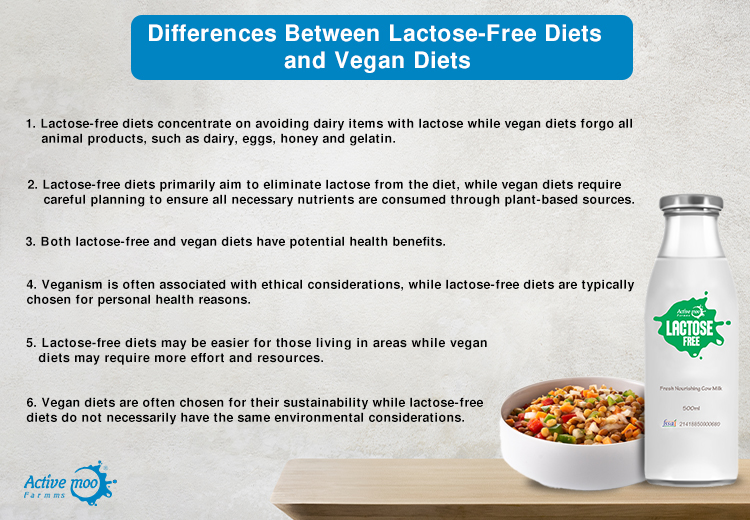With so many options available, choosing the right one for you can be overwhelming. The lactose-free and vegan diets are two well-liked eating plans that frequently come up in conversations. Despite their apparent similarity, they are very different.
Dairy items that contain lactose, a natural sugar present in milk and other dairy products, are prohibited from a lactose-free diet. Millions of individuals throughout the world suffer from lactose intolerance, and avoiding lactose can help with gastrointestinal problems like bloating, gas, and diarrhea. On the other hand, a vegan diet avoids all animal products, including meat, dairy, eggs and honey and is based on the philosophy that animals have a right to life and freedom from exploitation.
Both lactose-free and vegan diets offer numerous health benefits, including weight loss, improved digestion, reduced inflammation and a lower risk of chronic diseases, such as heart disease, diabetes and cancer. Additionally, both diets are more sustainable and environmentally friendly than a typical Western diet that relies heavily on animal products.
But how may you opt for the diet that’s best for you? This choice is heavily influenced by factors like lifestyle, ethics, and personal health requirements. In this article, we will explore the key differences between lactose-free and vegan diets and their benefits and provide tips on determining which one may be the best fit for your unique situation.
Lactose-Free Diets
A diet that forbids the consumption of lactose, a naturally occurring sugar present in milk and other dairy products, is known as a lactose-free diet. The prevalence of lactose intolerance is widespread throughout the world, especially in adulthood. People who are lactose intolerant have difficulty digesting lactose, which can lead to digestive issues such as bloating, gas and diarrhea.
A lactose-free diet eliminates dairy products such as milk, cheese, ice cream, yogurt, and any other foods that contain lactose as an ingredient. It’s important to understand that lactose-free does not necessarily imply dairy-free. There are many lactose-free dairy products available, including lactose-free milk, cheese, and yogurt. That is suitable for lactose intolerant people.
A lactose-free diet has several advantages, such as better digestion, less discomfort in the digestive system and higher nutrient absorption. Many lactose-intolerant persons also feel better after switching to a lactose-free diet. It’s crucial to make sure you are still consuming all of the essential nutrients that dairy products offer, like calcium, vitamin D and protein. Alternatives like fortified tofu, dark leafy greens and plant-based milk can help make up for any nutrient shortages.
Vegan Diets
A Vegan diet is one that forbids the consumption of any meat, dairy, eggs, honey or other items produced from animals, including gelatin, whey and casein. Vegans choose to eat this way for a number of reasons, including moral concerns about the suffering of animals, environmental concerns, and worries for their own health.
Vegan diets frequently consist of plant-based foods such fruits, vegetables, grains, legumes, nuts, and seeds. Vegan dieters must make sure they are still consuming all the essential nutrients, including protein, calcium, iron and vitamin B12. Consuming a range of plant-based foods and fortified goods like plant-based milk and cereal will help you achieve this.
A vegan diet has many advantages, including better heart health, better control of weight and a lower risk of developing certain chronic illnesses including type 2 diabetes and some malignancies. Following a vegan diet, many people also claim to feel more energized and have cleaner skin.
Key Differences Between Lactose-Free Diets and Vegan Diets
- Foods to Eat and to Avoid: Diets low in lactose, concentrate on avoiding dairy items with lactose. Vegan diets forgo all animal products, such as dairy, eggs, honey and gelatin, as well as any items made from animal byproducts, such whey and casein.
- Nutritional Value: Lactose-free diets primarily aim to eliminate lactose from the diet, while vegan diets require careful planning to ensure that all necessary nutrients, such as protein, calcium, iron, and vitamin B12, are being consumed through plant-based sources.
- Health Benefits: Both lactose-free and vegan diets have potential health benefits. Lactose-free diets may improve digestive symptoms in those who are lactose intolerant. Vegan diets, on the other hand, have been linked to a lower incidence of chronic conditions like heart disease, type 2 diabetes, and several malignancies.
- Ethical Considerations: Veganism is often associated with ethical considerations, including animal welfare and environmental concerns, while lactose-free diets are typically chosen for personal health reasons.
- Sustainability: Vegan diets are often chosen for their sustainability, as animal agriculture has a significant environmental impact. Lactose-free diets do not necessarily have the same environmental considerations, as dairy products can still be a part of sustainable agriculture practices.
- Accessibility: Lactose-free diets may be easier for those living in areas where plant-based foods are less available or more expensive. Vegan diets may require more effort and resources to ensure proper nutrition, especially for those with limited access to plant-based food sources.

Which Diet is Right for You?
Making the correct diet choice for you might be challenging, especially when considering two diets like, lactose-free and veganism. In the end, the decision is influenced by a variety of factors, including the individual’s health requirements, moral considerations, and lifestyle choices. A lactose-free diet could be required if you are lactose intolerant or have other health issues in order to prevent digestive problems.
On the other hand, if you are passionate about animal rights or environmental sustainability, a vegan diet may align more closely with your values. Your lifestyle and accessibility to food sources can also play a role in determining the feasibility of each diet. Vegan and lactose-free diets can be beneficial for your health, but you must make sure you’re getting enough nutrition.
It’s important to consult with a healthcare professional or registered dietitian to determine the best approach for your individual needs, preferences, and values. They can provide additional guidance and support to help you make an informed decision about which diet is right for you.
Also Read: Tips for Incorporating Lactose-free Milk into Your Diet
Takeaway
Both lactose-free and vegan diets have their unique benefits and challenges. While lactose-free diets are necessary for those who are lactose intolerant, veganism is a lifestyle choice that is rooted in ethical and environmental concerns. Each diet requires careful planning to ensure adequate nutrition, but it can be healthy and satisfying.
Ultimately, the decision on which diet is right for you depends on various factors, including personal health needs, ethics, and lifestyle. Before making any significant dietary adjustments, it’s crucial to take into account all of these aspects and consult a qualified nutritionist or healthcare provider.
They can advise you on the best course of action and show you how to satisfy your nutritional requirements while adhering to a lactose-free or vegan diet. With the right planning and support, you can successfully follow a lactose-free or vegan diet and enjoy the benefits that each has to offer.
FAQ’s
Is lactose-free milk real cow milk?
For people with lactose tolerance lactose-free milk is still genuine cow’s milk from an actual dairy product. To aid in digestion, the lactose has either been broken down or, in some circumstances, completely filtered out of the milk.
Should lactose-free milk be boiled?
It’s a frequent myth that lactose can be removed from milk by boiling it. Despite the fact that boiling milk is an effective approach to get rid of any bacteria that may be present, lactose intolerant people won’t find it any more comfortable to drink.
Does paneer have no lactose?
Since most of the lactose in the milk is removed during the curdling process, paneer might be a good choice for those who are lactose intolerant. Paneer still includes some lactose, therefore those who have a strong lactose intolerance may still feel sick after eating it.
What five things are lactose examples?
Paying attention to words like “butter,” “cheese,” “cream,” “dried milk,” “milk solids,” “powdered milk,” and “whey” as these may indicate the presence of lactose in the dish.
What is the other term for lactose?
Lactose, sometimes known as milk sugar (Latin, lac, milk), is a disaccharide found in the milk of many mammals, including humans and cows. Lactose is known by the IUPAC nomenclature 4-O-(-d-galactopyranosyl)-d-glucopyranose.

